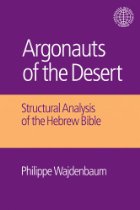 This post recapitulates earlier posts on the Documentary Hypothesis and introduces Philippe Wajdenbaum’s case for comparing the Bible with Classical Greek literature and finding the biblical author’s (sic) sources of inspiration there.
This post recapitulates earlier posts on the Documentary Hypothesis and introduces Philippe Wajdenbaum’s case for comparing the Bible with Classical Greek literature and finding the biblical author’s (sic) sources of inspiration there.
Late last year I wrote Who Wrote the Bible? Rise of the Documentary Hypothesis.
That post outlined the milestones towards the DH as set out by Philippe Wajdenbaum in Argonauts of the Desert:
- Baruch Spinoza‘s views of single authorship behind the historical books of the Bible;
- the way biblical studies were influenced by the early Homeric studies evolutionary model that hypothesized disparate oral traditions being stitched together by later editors to create a final canon;
- the failure of biblical studies to keep abreast of Homeric studies when they confronted the problems with their evolutionary hypothesis;
- the contribution of Julius Wellhausen and the labeling of the J, E, D and P sources and the final redactor R;
- Gerhard von Rad‘s fleshing out of these sources into historical provenances: J to the southern Kingdom of Judah, E to the kingdom of Israel, D to the time of Josiah, P to the period of Exile;
- Martin Noth‘s qualifications and modifications to the Documentary Hypothesis: a Deuteronomist historian wrote Deuteronomy, Joshua, Judges, Samuel and Kings during the Exile, and a Redactor later found a way to harmonize the Genesis, Exodus, Leviticus and Numbers with these Deuteronomist books;
- F. M. Cross and R. E. Friedman who decided Noth’s Deuteronomist historian was rather two historians, one writing in the time of Josiah and the other during the Exile;
- Thomas Römer‘s criticism of
- Wellhausen’s hypothesis for its nineteenth-century German Protestant and royalist assumptions;
- Noth’s views for their subjective mirroring of his personal situation with Nazi Germany;
- Cross’s subjective transfer of American optimism and idealism of the founding fathers into the period of King Josiah.
.
I then wrote Who Wrote the Bible Part 2: Challenging the Documentary Hypothesis. Continue reading “Collapse of the Documentary Hypothesis (1) & Comparing the Bible with Classical Greek Literature”
